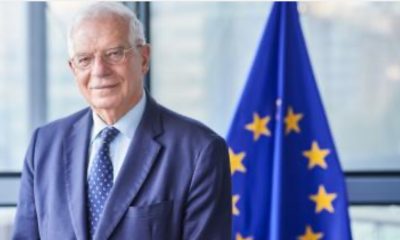Adeyemo stated that he believes the economic impact will be as immediate as the previous sanctions. According to U.S. officials, Russia's economy will contract by 10% this year while inflation is near 20%.
Russia
How the US plans to starve Russia's 'war machine' -Treasury's Adeyemo

The United States has increased sanctions against Russia in an effort to deprive Moscow of the money and other components it needs to support its invasion of Ukraine. However, it will take time to curb Russia's main source of funding, Russian energy imports, U.S. Deputy Treasury Secret Wally Adeyemo said to Reuters on Thursday.
Adeyemo said in an interview that the United States and its allies had "a lot more than we can and will do" to punish Moscow if Russia continues its invasion.
On Thursday, leaders of Ukraine called for the international financial system to cut off Russian banks and stop purchasing Russian oil and gas
Adeyemo stated that President Joe Biden announced Wednesday a new ban on Americans investing in Russian companies' equity, debt, and investment funds. This will prohibit them from investing in Russian-related businesses. It also cuts off Russia's defence sector and other areas from the largest source of capital investment.
Adeyemo stated that this would mean Russia losing the capital it needs for its economy and to invest in its war machines.
When asked if it would ban companies in Russia from funding further operations, he replied that Treasury was working with the private sector.
Officials from the Kremlin, who described their actions in Ukraine in a "special military operations", insist that Western sanctions will have no effect on their goals and will strengthen Russian support
Adeyemo stated that the United States and its European allies would target Russian military supply chain to prevent access to key components. These are "things that are essential to building their tanks and supplying missiles, and making sure they have fewer resources" in order to not only fight the war in Ukraine, but also to project future power.
Later on Thursday, the Treasury placed Russian diamond miner Alrosa (ALRS.MM) on its sanction blacklist. The U.S. State Department also did the same for United Shipbuilding Corp. This is a state-owned company that builds naval ships and submarines, as well as its subsidiaries and board members.
Brian Deese, White House Economic Council director, stated Wednesday that the Biden government would also ban transactions with United Aircraft Corp -- the maker of Sukhoi fighter jets and MiG fighter planes -- which are also flown in part by U.S. allies, including some NATO members.
Adeyemo stated that Russia's defence industry has created front companies since 2014 to purchase critical supplies and materials for building Moscow's military. Many of these companies were hit by the sanctions last month.
Adeyemo stated that Russia has been forced to use more of its hard currency energy revenues to protect its rouble currency. This is reducing the funds available to support the war effort.
The Russian rouble lost 45% against the dollar within the first two weeks after the invasion of Ukraine. However, it has now risen to just below pre-war levels due to capital controls by Moscow, and distortion by Russia's central bank.
He stated that Russia is now less financially able to choose between investing in Ukraine's war and supporting the economy. Adeyemo stated that his last week meetings with European allies in London Brussels, Paris, Paris, and Berlin helped focus on next steps and helped accelerate the announcement of sanctions on Wednesday .
Adeyemo stated that he was encouraged to hear from European countries about decreasing their dependence on Russian energy, but that the continent was not in the same position as the United States, which is the world's largest oil producer.
He said, "Because we can produce energy at home and were able ban the Russian imports of oil to America quite quickly." They're working to reduce their dependence over time, although it will take them longer.
Share this article:
-

 Conferences3 days ago
Conferences3 days agoNatCon’s on-off conference halted by Brussels police
-

 Mass surveillance4 days ago
Mass surveillance4 days agoLeak: EU interior ministers want to exempt themselves from chat control bulk scanning of private messages
-

 Conferences4 days ago
Conferences4 days agoNatCon conference to go ahead at new Brussels venue
-

 European External Action Service (EAAS)4 days ago
European External Action Service (EAAS)4 days agoBorrell writes his job description



























